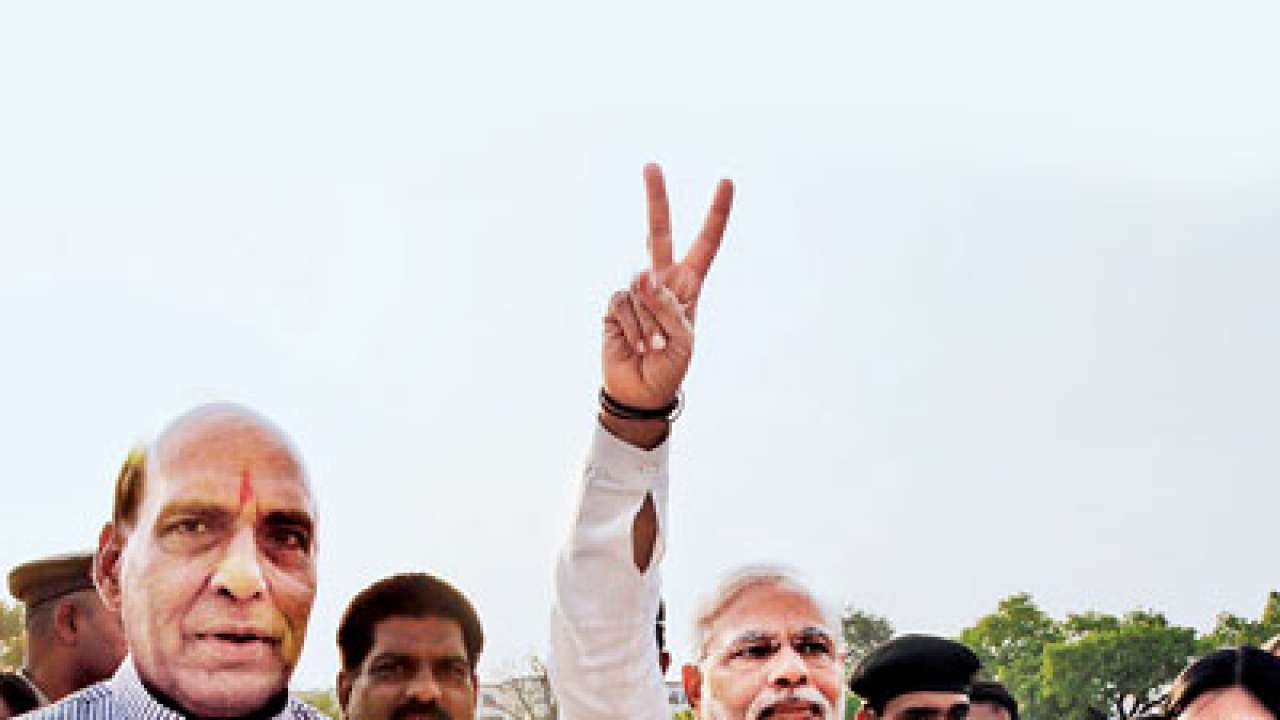
The Narendra Modi blitzkrieg in the 2014 Lok Sabha election raises eyebrows over things like psychological manipulation and even ethics which should serve as a case-study in a reasonably respectable MBA course. This does not take away from the tremendous victory that the BJP has scored with Modi as its prime ministerial candidate.
The unprecedented triumph of the last quarter-century has drowned out debates on rhetoric, refutation, rancour, invective and innuendo. Campaigns do not provide the ideal atmosphere for a cool exchange of viewpoints though the rationale of election in a democracy is exactly that. People have to make a choice based on imperfect and incomplete information and in the midst of deafening din and they make the best job of it. More than the parties and leaders, more than the media, it is the people who should get the ultimate credit for turning out the best verdict in the worst conditions.
It becomes necessary to revisit campaign themes after the election, the theme song of the winning party and that of the loser. There is a need to look closely at the BJP's and Modi's views on development. It is inevitable that the performance of the outgoing UPA II government and the Congress poll talk will also come in for scrutiny. BJP has every right to claim that the victory is an endorsement of its poll agenda and that its re-examination is irrelevant and anfructuous. The debate on the BJP agenda is not closed and it has to be kept open.
Modi's emphasis on development is fired by the anguish that it is possible for all people to lead a decent life and that they deserve it. Secondly, it is inspired by the patriotic zeal that a developed India will be a matter of pride for Indians and that of envy for the rest of the world. It is an earthy sentiment and aspiration. This view of development is unidimensional. In politics, and especially on the campaign trail, it is best to keep it straight and simple. And the Modi strategy has been to keep to the basics. But now that the election is behind us and BJP and Modi are in power, the development theme cannot be left hanging as it was spelt out in the run-up to the election and in the heat of the campaign.
Many Indian politicians who believe ardently in development, and the list includes Modi along with TDP's Chandrababu Naidu, look at East Asian countries like Singapore, Taiwan, South Korea, and sometimes China. This is a simplistic view because it is often overlooked that these countries where development achievements are dazzling, the political systems are authoritarian and the industrial practices are monopolistic with industry houses enjoying State patronage. These aspects of development cannot be removed from the big picture. Development enthusiasts often ignore them.
There is the argument, generally favoured by the so-called aspirational class, that once development is attained, it is easy to get the rest of the things — freedom, cultural enrichment, intellectual breakthroughs — and that it would be wrong to muddle the picture by invoking these other intangible things. The logic of development as a matter of fact runs in the reverse. That is, development flows from freedom, culture and intellect. This is the American model. The Asian Tigers comprising the countries mentioned above, followed a development paradigm that involved replicating the technological successes achieved elsewhere. Without explicitly stating it, Modi, and Naidu, are following the Asian Tigers' example.
It is not necessary to re-invent the wheel, and replicating what has already been done elsewhere is no sin. What is useful in the short run however turns out to be a disadvantage in the long run. If the prerequisites of freedom, culture and intellect are not there, then development does not ever gain its own momentum. It will always be dependent on development patterns developed elsewhere. If there is a crisis or breakdown over there, then there will be gloom over here. That is why, development has to have its roots in the soil here. The only way to nurture this is to have centres of intellectual excellence, where there is a clash of different ideas and views. Governments and leaders can help if they encourage State-supported universities to develop this culture of throwing up new and different ideas. It involves the idealistic paradox that the State should set up educational institutions and let them function in total freedom. Visionaries, including political ones, are so obsessed with utopia that they do not care much for an open debate because they feel that their view is complete and perfect, and that there is no scope for further discussion on it.
In his post-poll speech at Ahmedabad on Friday night, Modi claimed that he forced his opponents to talk about the issue of development because they ferreted out the developmental deficiencies in Gujarat to prove him wrong. His critics did not pin him down on his views on development, but they, especially the Congress and the crowd of secularists — crossed swords over the issue of secularism, arguing that he was anti-Muslim and that he is divisive. Modi had cleverly sidestepped the issue. He has tried to define the debate on secularism on his own terms — by appealing to the people of India and refusing to name the Muslims specifically. He met Muslims but he did not make the familiar gestures that have come to be associated with degraded secularism. This debate which should have been meaningful has become hollow and that is why it has failed to challenge Modi. The Congress manner of practising secularism is indeed hypocritical, but this does not mean that the Muslim question does not exist. It is not good for democracy in India if Muslims shun Modi or when Modi ignores them. Modi and Muslims will have to come to terms with each other, and they have to engage in a debate, including an adversarial one.
The author is editorial consultant with dna